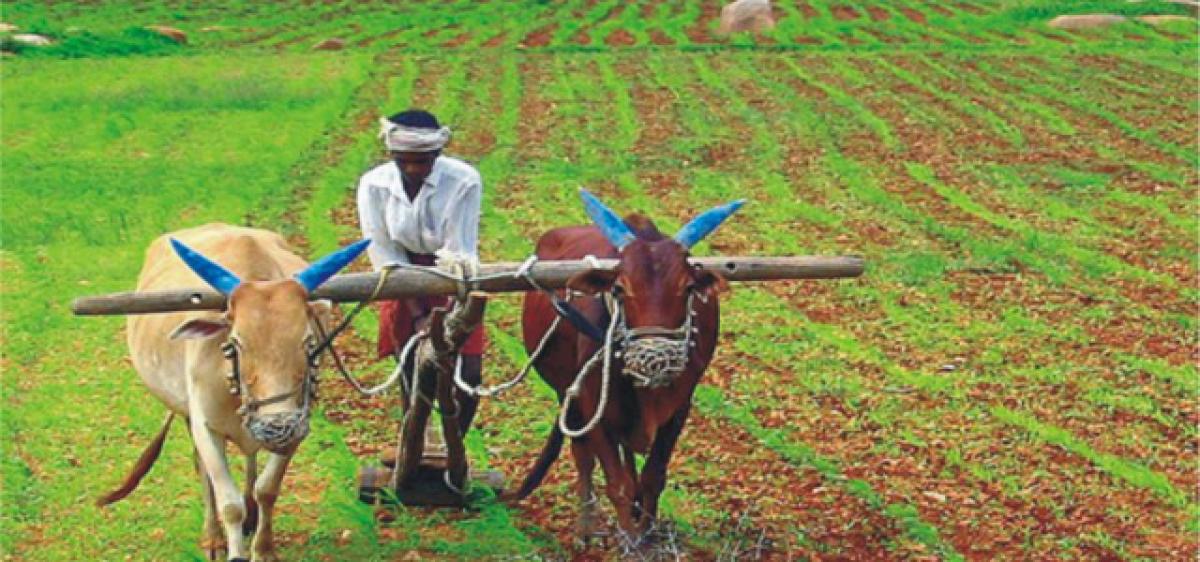Live
- Vision document historical, says Keshav
- YSRCP to boycott elections to WUAs
- Farmers led by YSRCP leaders stage protest against graft
- MLA Dhanpal reminds Cong of promise of gold for brides
- Dy CM Pawan hails Swarna Andhra@2047 vision document
- Ensure success of Mathematic Talent exam
- Atchannaidu expresses concern over fall in tomato price
- Goshamahal Welfare Assn petition Collector seeking withdrawal of Osmania Hosp plans at stadium
- Indiramma Housing scheme 4L applications received in RR dist
- 3 Indian students killed in Canada; India takes up issue of safety with Ottawa
Just In

Hitherto, emphasis was laid on production and productivity of crops and related trades of farm sector. We gained sufficient dividends to the extent we achieved food security act by 2013. However we are entangled in the methods that are economically and environmentally unviable at producer and consumer levels. The troubles in family farming surfaced as early as 1990s in the shape of suicides of pea
Hitherto, emphasis was laid on production and productivity of crops and related trades of farm sector. We gained sufficient dividends to the extent we achieved food security act by 2013. However we are entangled in the methods that are economically and environmentally unviable at producer and consumer levels. The troubles in family farming surfaced as early as 1990s in the shape of suicides of peasants and migration of farm workers.
Several experts in socio-economic and political line reminded the policy makers to intervene, since deep crisis is precipitating in farm sector. However the priorities of governments did not alter, resulting in abnormal pressure on base level farm workers. Of late, the present government, which came to power on the commitment of reforming agriculture in favour of farmers and workers, constituted Prof R Radhakrishna Commission, which submitted its report in 2016 August. There was no change in the attitude of either policy makers or executers, except doling out loan waivers.
As per expert assessments made at a recent conference in Guntur, there has been tremendous transformation in farming due to entry of new inputs and methods during the last two decades of economic liberalisation and globalisation of all trades related to agriculture like crop production, animal husbandry, poultry, fisheries etc. This caused new opportunities for few and deprivations for many, resulting in more economical and social gap. The entry of trade sector with corporate culture doubled the sufferings of base level workers, which reflect in landlessness and absentee land-lordism.
However, as per the evaluations of government, there was tremendous growth in the production of food grains, meat, milk, eggs and fish of both marine and fresh-water. However, the impact analysis on energy utilisation, resource exploitation, environment degradation and changes in service sectors is missing. Adjustments with specific social support schemes like rice-based public food distribution also created imbalance in crop areas and cultivation methods. This led to distress of peasantry and crisis in production. Land relations in terms of landlessness among actual tillers, land accumulations among non-farming sections has resulted in abnormal social and economic relations as is clearly seen in coastal districts now.
The swelling in numbers of tenant farmers complicates the system further. The entry of new and costly inputs in the guise of elimination of human drudgery and the wide popularity given to short gain technologies in agriculture are masking the negative trends and unwanted changes in resource utilisation.
Experts feel that in order to protect the interests of consumer and market forces, the government is adding burden on producer, which reflects currently in terms of insecurity and bankruptcy among a large section of peasants. There is also failure of public institutions and technocrats in estimating the role of agro-ecology. Non-pesticides management and production method works well, evidenced with expansion in lakhs of acres across several states including Sikkim, Kerala, Tripura, AP, Telangana. However, few impediments still exist.
There is a clear failure to involve public-funded institutes in this line of work. Similarly, many experts in the name of modernity continue to belittle the alternatives. Few even resort to distortions to this approach by dove-tailing religious and conservative values to the alternative methods.
The value of biomass that is essential to retain basic character of soil and retention of cyclic-phenomenon in energy transfer is underestimated.
Hence, we should be cautious in expanding alternatives to the existing crisis-ridden farming method. Change in production, reforms in market sector, alterations in policy framework can only save tiller and ultimately consumer and environment. (Writer is Convener, Rythu Rakshana Vedika, Guntur)
By Prof N Venugopal Rao

© 2024 Hyderabad Media House Limited/The Hans India. All rights reserved. Powered by hocalwire.com







